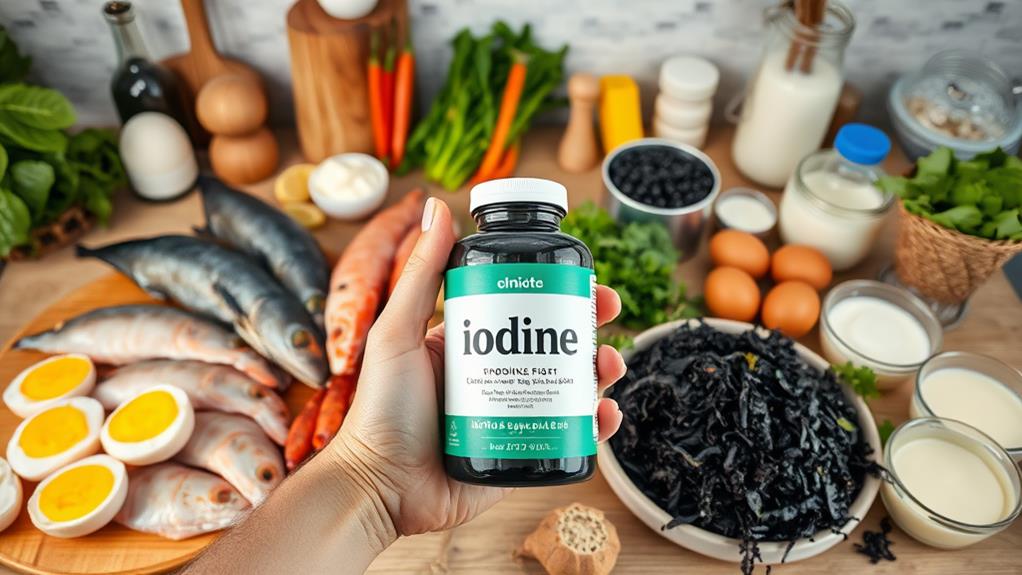
Managing a keto diet when you have thyroid issues can be tricky, but it's doable! First, focus on healthy fats like avocados and nuts, low-carb veggies like leafy greens, and lean proteins like chicken and fish. Be sure to get enough iodine, selenium, and zinc, as these nutrients help your thyroid work properly. Watch out for too much caffeine and processed foods, which can mess with your thyroid. Always check in with your healthcare provider to keep an eye on your thyroid levels. Ready for a deeper exploration into balancing keto and thyroid health? Stick around!
Key Takeaways
- Consult healthcare professionals to tailor the keto diet according to your thyroid health and avoid potential nutrient deficiencies.
- Include iodine-rich foods like seafood and iodized salt to support thyroid hormone production.
- Ensure selenium intake with foods like Brazil nuts and eggs to aid in hormone conversion.
- Prioritize healthy fats from sources like avocados, olive oil, and fatty fish to reduce inflammation.
- Avoid processed foods, sugars, and gluten to minimize inflammation and support optimal thyroid function.
Hypothyroidism and Diet
In the context of hypothyroidism, dietary choices play a pivotal role in managing symptoms and overall health. Hypothyroidism affects about 4.6% of the U.S. population, causing symptoms like fatigue, weight gain, and depression. These thyroid symptoms can be really tough, but the right dietary choices can make a big difference.
Eating a balanced diet that includes essential nutrients is vital. Nutritional deficiencies in iodine, selenium, and zinc can make hypothyroidism symptoms worse. So, it's super important to eat foods rich in these nutrients. Fresh vegetables, lean proteins, healthy fats, and whole grains are great choices. They help keep inflammation down, which is vital for thyroid health.
On the other hand, try to avoid processed foods and sugars. These can increase inflammation and make your symptoms worse.
Anti-inflammatory eating plans, like plant-based diets, have been linked to better thyroid function and might even prevent autoimmune thyroid diseases.
Understanding the Keto Diet
Characterized by its high-fat, low-carbohydrate intake, the ketogenic (keto) diet aims to induce a metabolic state known as ketosis, where the body shifts from using glucose to utilizing ketones produced from fat for energy.
To get there, you need to make some keto basics and dietary adjustments. Typically, the diet consists of 70-75% fats, 20-25% protein, and only 5-10% carbohydrates. Sounds simple, right?
But there's more to it than just cutting out bread and pasta. When in ketosis, your body becomes a fat-burning machine, which can boost energy levels and help with weight loss.
Here are three key points to help you visualize this transformation:
- High Fat Intake: Imagine avocados, nuts, and cheese becoming your new best friends. You'll need to eat lots of healthy fats.
- Low Carbs: Say goodbye to sugar and hello to leafy greens. Your plate will look different, but your taste buds will adapt.
- Protein Balance: Not too much, not too little. Think of it as a Goldilocks zone for protein to keep muscle but not kick you out of ketosis.
Originally used to manage epilepsy, the keto diet has become popular for its potential to improve metabolic health.
Keto and Thyroid Function
As the ketogenic diet continues to gain popularity, its implications for thyroid function warrant careful consideration. The keto diet might lead to decreased T3 levels, influencing thyroid hormone conversion and overall function. This reduction in T3 can sometimes hinder thyroid performance, especially during keto adaptation when the body adjusts to low carbohydrate intake.
Weight loss on the keto diet can be a double-edged sword for the thyroid. While shedding pounds might improve thyroid function for some, it could also negatively impact others, making careful monitoring essential.
Insulin levels drop on a keto diet, and since insulin is critical for converting T4 to T3, lower insulin might mean less active thyroid hormone.
Moreover, strict adherence to the keto diet could lead to nutritional deficiencies in vitamins and minerals necessary for thyroid health, like iodine, selenium, and zinc. These deficiencies can further challenge thyroid function.
Therefore, individuals with thyroid issues considering the keto diet should consult healthcare professionals. Adjustments to thyroid medication and regular monitoring of hormone levels are essential for ideal management.
Balancing the benefits of keto with thyroid health requires a thoughtful, well-informed approach.
Essential Nutrients
Iodine is super important for making thyroid hormones, so you need to eat foods like iodized salt and seafood to avoid hypothyroidism.
Selenium helps change T4 into the active T3 hormone, with 200 mcg per day possibly easing symptoms of Hashimoto's thyroiditis.
Zinc is also key for thyroid health, and you can find it in foods like meat, shellfish, and legumes.
Importance of Iodine
Given its pivotal role in thyroid hormone synthesis, iodine is an essential nutrient that must be adequately consumed to secure proper thyroid function.
Without enough iodine, you might develop thyroid issues like hypothyroidism. This can mess with your metabolism and energy levels, making you feel sluggish and tired.
So, where do you get iodine from? Here are some key iodine sources to include in your diet:
- Seaweed: This is one of the richest sources of iodine. A little goes a long way, so you don't need to eat it every day.
- Fish and Dairy Products: These are not only delicious but also packed with iodine. Think salmon, yogurt, and milk.
- Iodized Salt: Simply switching to iodized salt can make a big difference. It's an easy way to guarantee you get your daily dose.
Iodine deficiency is a global issue affecting about 2 billion people. It can lead to goiter and other thyroid problems.
But, remember, too much iodine isn't good either. Moderation is key. So, balance your intake and keep your thyroid happy!
Role of Selenium
Selenium, a trace mineral found in various foods, is indispensable for ideal thyroid health. This tiny but mighty nutrient plays a vital role in thyroid hormone production. If you have thyroid issues, especially Hashimoto's thyroiditis, getting enough selenium can make a big difference. With a recommended daily intake of 200 mcg, selenium has been shown to decrease thyroid antibodies and improve symptoms.
One of the coolest selenium benefits is its ability to help convert the inactive thyroid hormone T4 into the active T3. T3 is super important for your metabolism and overall thyroid function. Without enough selenium, this conversion process can slow down, leading to thyroid dysfunction. That's why including selenium sources in your diet is key.
You can find selenium in foods like Brazil nuts, seafood, organ meats, and whole grains. Imagine munching on a few Brazil nuts—just a couple can meet your daily selenium needs!
Besides supporting hormone production, selenium also has anti-inflammatory effects, which can help reduce inflammation from autoimmune thyroid conditions. So, if you're on a keto diet and have thyroid issues, don't forget to keep your selenium levels in check for a healthier thyroid.
Zinc and Thyroid
Understanding the intricate relationship between zinc and thyroid health underscores the significance of this essential mineral. Zinc is essential for the synthesis of thyroid hormones and their receptor function. When there's not enough zinc in your diet, your thyroid hormone production can take a hit, leading to symptoms like fatigue and weight gain. These are common issues for people dealing with hypothyroidism.
Ensuring you get the recommended daily allowance (RDA) of zinc—11 mg for men and 8 mg for women—is critical. Here are three key ways to incorporate zinc sources into your diet:
- Lean meats and shellfish: Foods like beef, chicken, and oysters are rich in zinc.
- Legumes, seeds, and nuts: Beans, lentils, pumpkin seeds, and almonds are excellent plant-based options.
- Dairy products and whole grains: Milk, cheese, and whole wheat bread can also help you meet your zinc needs.
If diet alone isn't enough, zinc supplementation can be beneficial. Studies show it can decrease thyroid antibodies and improve symptoms in people with Hashimoto's thyroiditis.
Foods to Include

When managing thyroid issues with a keto diet, it's important to pick the right foods.
Non-starchy veggies like leafy greens and bell peppers are great for vitamins and minerals without the carbs.
Pair them with healthy fats from avocados and olive oil, and lean proteins such as fish and chicken, to support your thyroid and overall health.
Key Nutrient-Rich Foods
A well-balanced diet is crucial for managing thyroid issues, and incorporating key nutrient-rich foods can greatly support thyroid function. If you have thyroid issues and are following a keto diet, it's important to include foods that are rich in iodine, selenium, zinc, and vitamin D.
These nutrients are essential for thyroid health, so let's explore some tasty options that you can easily include in your keto snacks and meal prepping.
1. Iodine-Rich Foods: Seafood like shrimp and cod, dairy products, and iodized salt are all excellent sources of iodine.
These foods help your thyroid produce hormones properly. Imagine a yummy shrimp salad or a cheesy omelet in your meal plan.
2. Selenium-Rich Foods: Brazil nuts, tuna, and eggs are top stars here.
Selenium helps convert thyroid hormones into their active forms. Why not snack on a handful of Brazil nuts or whip up some tuna salad?
3. Zinc Sources: Chickpeas, lentils, and pumpkin seeds are great for giving your thyroid a zinc boost.
Zinc improves hormone production and receptor function. Picture a pumpkin seed snack or a hearty lentil soup in your meal prep routine.
Incorporating these foods can make a world of difference in managing thyroid issues while staying keto!
Healthy Fat Sources
While incorporating key nutrient-rich foods is essential for thyroid health on a keto diet, equally important is ensuring your diet includes healthy fat sources. These fats play a significant role in maintaining energy levels, supporting thyroid function, and reducing inflammation.
Avocados are a fantastic fat source, packed with monounsaturated fats, fiber, potassium, and vitamins. They not only boost heart health but also keep you feeling full and satisfied. Olive oil, especially extra virgin, is another staple. It's rich in heart-healthy monounsaturated fats and antioxidants, which can help reduce inflammation.
Fatty fish like salmon, mackerel, and sardines are excellent sources of omega-3 fatty acids. These fats are beneficial for thyroid health and can help reduce inflammation associated with autoimmune conditions. Nuts and seeds, including almonds, walnuts, flaxseeds, and chia seeds, provide healthy fats, fiber, and essential nutrients like magnesium and selenium, vital for thyroid function.
Coconut oil, containing medium-chain triglycerides (MCTs), is easily metabolized for energy and may aid in weight management and metabolic health. Including these healthy fat sources in your keto diet can provide the necessary nutrients to support thyroid health.
| Food Item | Key Nutrients | Benefits |
|---|---|---|
| Avocados | Monounsaturated fats | Heart health, satiety, nutrient-dense |
| Olive Oil | Antioxidants, healthy fats | Reduces inflammation, heart health |
| Fatty Fish | Omega-3 fatty acids | Reduces inflammation, thyroid support |
| Nuts and Seeds | Fiber, healthy fats | Thyroid function, nutrient-dense |
| Coconut Oil | MCTs | Energy metabolism, weight management |
Lean Protein Options
Selecting lean protein options is vital for supporting thyroid health while adhering to a keto diet. Choosing the right proteins can make a big difference in how your body functions and feels. Here are some top picks to take into account:
1. Chicken and Turkey: Lean protein benefits include providing essential amino acids without too much saturated fat. Skinless chicken breasts and turkey are great choices. They keep you full and energized, helping you stick to your keto goals while supporting your thyroid.
2. Fatty Fish: Salmon and mackerel are not only delicious but also packed with omega-3 fatty acids. These fatty acids help reduce inflammation, which is especially beneficial for hypothyroidism.
Plus, they offer high-quality protein that your body can easily use.
3. Eggs: Versatile and nutrient-rich, eggs are a fantastic lean protein option. They are loaded with vitamin D and B12, important for thyroid health and energy metabolism.
Whether boiled, scrambled, or made into an omelet, eggs fit perfectly into your keto plan.
Foods to Avoid
For individuals managing thyroid issues, it is essential to be mindful of certain foods that can potentially exacerbate their condition. One major area of concern is gluten sensitivity. For some, especially those with Hashimoto's disease, gluten can trigger thyroid symptoms. While not everyone needs to eliminate gluten, paying attention to how your body reacts is vital.
Sugary and processed foods are another no-no. These can cause inflammation, which can mess with your thyroid health and hormone balance. Think of these foods like adding fuel to a fire—best to keep them at bay.
Caffeine is another culprit. It can interfere with thyroid medication absorption and make symptoms like anxiety and insomnia worse. So, if you love your coffee, you might need to cut back a bit.
Then there are goitrogenic foods, like soy and raw cruciferous vegetables such as broccoli and kale. Eating these in large amounts can inhibit thyroid hormone production. Don't panic— you don't have to give them up completely. Just don't go overboard.
Managing Iodine Intake

Iodine is critical for making thyroid hormones, so getting the right amount is super important, especially on a keto diet that might cut out some iodine-rich foods.
You need to find a balance; too little iodine can cause problems, but too much can mess up your thyroid too.
Including foods like fish, eggs, and iodized salt can help you get the iodine you need without going overboard.
Optimal Iodine Sources
Guaranteeing adequate iodine intake is fundamental for thyroid hormone synthesis, particularly for individuals managing thyroid issues like hypothyroidism.
Without enough iodine, your thyroid can't produce the hormones needed to regulate metabolism. But, it's also vital to avoid iodine toxicity, so striking a dietary balance is key.
Here are three excellent sources of iodine to help maintain a healthy thyroid:
- Iodized Salt: A pinch of iodized salt can go a long way. It's a simple and effective way to guarantee you're getting the recommended 150 mcg of iodine per day. Plus, it's easy to incorporate into almost any meal.
- Seafood: Think fish and seaweed. These ocean delights are naturally rich in iodine. However, moderation is essential, especially with seaweed, since too much can lead to iodine toxicity.
- Dairy Products and Eggs: These everyday staples not only provide calcium and protein but also a decent amount of iodine. Adding them to your diet can help achieve a balanced intake.
Iodine Intake Balance
Proper management of iodine intake is essential for maintaining thyroid health, particularly in individuals with thyroid conditions. Iodine is vital for making thyroid hormones, and both too little and too much can mess things up. Adults generally need about 150 mcg of iodine daily, but if you have thyroid issues, it's smart to get personalized advice from a healthcare professional.
Balancing iodine can be tricky. Too much iodine, especially from supplements, seaweed, and kelp, can worsen conditions like Hashimoto's disease. So, if you love sushi, maybe take it easy on the seaweed wraps!
On the flip side, you don't want to skimp on iodine either. Cooking cruciferous veggies, like broccoli and cauliflower, can help reduce their goitrogenic properties, making them safer to eat in moderation.
To keep everything in check, regular iodine testing is a good idea. Blood tests can help guarantee your iodine levels are just right. Knowing your iodine sources and how much you're getting can make a big difference.
Weight Management
For individuals with thyroid issues struggling with weight management, the ketogenic diet offers a promising approach by emphasizing low carbohydrate intake, which promotes fat burning and reduces insulin levels.
This diet can be particularly beneficial for those with hypothyroidism who often face challenges with weight gain. To maximize the benefits, consider incorporating intermittent fasting and paying attention to meal timing to further enhance fat burning and metabolic efficiency.
Key Strategies for Effective Weight Management on Keto:
1. Intermittent Fasting: This involves cycling between periods of eating and fasting. It can help regulate insulin levels and support metabolism, making it easier to manage weight.
2. Meal Timing: Eating at specific times rather than grazing throughout the day helps stabilize blood sugar levels and supports thyroid function.
Consistent meal timing can improve energy levels and overall health.
3. Nutrient-Dense Foods: Focus on leafy greens, healthy fats, and lean proteins. These foods provide essential nutrients while keeping you in a state of ketosis, promoting sustained energy and better thyroid health.
Regular monitoring of thyroid hormone levels is essential, as weight loss can affect thyroid function.
A gradual shift to the keto diet helps minimize any adverse effects on thyroid hormone conversion.
Inflammation Reduction

Reducing inflammation is essential for people with thyroid issues, and a ketogenic diet can be a game-changer.
By choosing anti-inflammatory foods like leafy greens and healthy fats, and cutting out processed foods, you can help your body fight inflammation more effectively.
Ketosis, the state your body enters on a keto diet, not only burns fat but also lowers inflammatory markers, making you feel better and supporting your thyroid health.
Anti-inflammatory Food Choices
Inflammation, a silent disruptor, plays a significant role in exacerbating thyroid issues. To combat this, adopting anti-inflammatory food choices can be incredibly beneficial. Foods with high nutrient density like leafy greens, berries, and fatty fish are excellent additions to your diet. These foods are rich in antioxidants and can help reduce inflammation associated with thyroid problems.
Adding anti-inflammatory herbs such as turmeric and ginger to your meals can provide additional benefits. These spices are known for their powerful anti-inflammatory properties and can further support thyroid health. Incorporate them into your daily cooking to get the most out of their healing properties.
Here are three key anti-inflammatory food choices:
- Leafy greens: Spinach, kale, and Swiss chard are packed with vitamins and minerals that help combat inflammation.
- Berries: Blueberries, strawberries, and raspberries are rich in antioxidants, which can lower inflammation levels in the body.
- Fatty fish: Salmon, mackerel, and sardines are high in omega-3 fatty acids, known to reduce inflammatory markers.
Limiting processed foods and added sugars is also essential, as these can promote inflammation and worsen symptoms.
Benefits of Ketosis
While anti-inflammatory food choices are fundamental for managing thyroid issues, another effective strategy lies in the metabolic state of ketosis. Achieving ketosis through a ketogenic diet can lead to a notable reduction in systemic inflammation, which is particularly beneficial for individuals with thyroid problems. Chronic inflammation is a common issue in hypothyroidism, and ketosis offers a way to address this.
Studies have found that the ketogenic diet can lower inflammatory markers like C-reactive protein (CRP). This reduction in inflammation can improve thyroid function and manage symptoms more effectively. By focusing on high-fat, low-carb intake, the body shifts its energy source from glucose to ketones. This change helps stabilize blood sugar levels and reduces insulin spikes, both of which can exacerbate inflammation.
Moreover, ketones themselves have anti-inflammatory properties that can modulate the immune response. This is especially helpful for those with autoimmune thyroid conditions like Hashimoto's disease. Additionally, weight loss and fat management from a ketogenic diet can reduce the inflammatory burden, promoting overall thyroid health. The keto benefits for inflammation control are multifaceted and impactful.
| Ketogenic Benefits | Mechanism | Impact on Thyroid |
|---|---|---|
| Lower CRP | Reduces inflammatory markers | Improved thyroid function |
| Shift to Ketones | Stabilizes blood sugar | Reduces insulin spikes |
| Anti-inflammatory Effects | Modulates immune response | Benefits autoimmune conditions |
Reducing Processed Foods
A crucial step in managing thyroid health involves minimizing the intake of processed foods. Reducing these foods can help lower inflammation, which is especially helpful for those with thyroid issues like Hashimoto's disease.
Processed foods often contain added sugars and unhealthy fats, which can worsen inflammation and bring on symptoms of hypothyroidism, such as feeling tired and gaining weight.
Here are three key ways to reduce processed foods and support your thyroid health:
- Meal Planning: Plan your meals ahead of time using whole, unprocessed foods. Think fresh fruits, vegetables, lean meats, and healthy fats. This makes it easier to avoid reaching for processed snacks.
- Nutrient Timing: Eat at regular intervals to keep your energy levels stable. Skipping meals can lead to cravings for sugary, processed foods, so aim to eat balanced meals throughout the day.
- Incorporate Fresh Produce: Replace processed snacks with fresh fruits and vegetables. These are rich in essential nutrients like vitamins A, C, and E, which support your immune system and help reduce inflammation.
Monitoring Hormone Levels
Maintaining ideal thyroid health requires diligent monitoring of hormone levels, particularly for those adhering to a ketogenic diet. Regularly checking thyroid hormone levels, including TSH and T4, is essential for making necessary dietary adjustments. A keto diet can impact hormone conversion and overall thyroid function, leading to hormone fluctuations. Consequently, blood tests every 6-12 months, or more frequently during dietary changes, are vital to guarantee thyroid hormones remain within the best range.
Individuals on a ketogenic diet might experience changes in their T3 levels, so tracking these fluctuations is important to understand how the diet affects thyroid function. Consulting with healthcare professionals for personalized monitoring plans can help verify that dietary modifications don't negatively impact thyroid health.
It's also a good idea to keep a detailed food diary alongside hormone level tracking. This way, you can see how different foods might be influencing your thyroid function and make informed dietary adjustments.
Exercise and Activity

Incorporating regular exercise into the daily routine can greatly benefit individuals with thyroid issues, particularly those managing hypothyroidism. Exercise routines not only enhance mood and energy levels but also support weight management, which is essential given that weight gain is a common symptom of hypothyroidism.
Engaging in both aerobic activities and strength training can boost metabolism and maintain muscle mass, which may be negatively affected by low thyroid hormone levels.
Effective Exercise Strategies
- Aerobic Activities: Walking, swimming, and cycling are fantastic choices. These exercises improve cardiovascular health, which is especially important for those with an increased risk of heart disease due to hypothyroidism.
- Strength Training: Incorporating weights or resistance bands into your routine can help build muscle mass. This is significant because muscle mass can be adversely affected by low thyroid hormones, and building it up can improve overall metabolism.
- Activity Modifications: Adjusting your activities to fit your energy levels is important. Start slow and gradually increase intensity to avoid overexertion, which can worsen symptoms.
Always consult with a healthcare provider before beginning any new exercise regimen to verify it's safe and tailored to your needs.
Stress Management
Managing stress is essential for individuals with thyroid issues, as chronic stress can disrupt thyroid function by elevating cortisol levels, which may suppress thyroid hormone production. This can make symptoms of hypothyroidism worse.
Luckily, there are ways to handle stress that can also help your thyroid. One great way to reduce stress is through mindfulness techniques. These can include activities like mindfulness meditation, yoga, or deep-breathing exercises. They help calm your mind and body, leading to cortisol reduction.
Imagine sitting quietly, focusing on your breath, and feeling the stress melt away. Sounds nice, right?
Regular physical activity is another effective method to manage stress. Whether it's a brisk walk, a fun dance class, or a gentle jog, moving your body helps release endorphins, which are natural stress relievers.
Don't forget about sleep! Getting enough sleep is critical because lack of sleep can increase cortisol levels, making things even harder for your thyroid.
Eating a balanced diet rich in anti-inflammatory foods can also help combat stress. Foods like leafy greens, nuts, and fatty fish support adrenal health, which in turn supports your thyroid.
Professional Guidance

While stress management plays a significant role in maintaining thyroid health, seeking professional guidance is equally important for individuals considering a ketogenic diet.
Collaborating with healthcare professionals, such as endocrinologists and registered dietitians, guarantees that dietary adjustments are made with thyroid health in mind. Regular monitoring of thyroid hormone levels is essential, as the ketogenic diet can impact hormone levels and medication needs.
Professional guidance offers several benefits:
- Personalized Nutrition Counseling: A registered dietitian can help tailor your diet, guaranteeing it meets your specific needs. They can also help identify any potential nutrient deficiencies, such as selenium and zinc, that might arise from a keto diet and recommend appropriate supplements.
- Meal Planning Assistance: Dietitians can assist with creating meal plans that balance macronutrients within a ketogenic framework while emphasizing anti-inflammatory foods.
- Health Condition Evaluation: Consulting healthcare providers is fundamental for evaluating the suitability of the ketogenic diet based on your individual health conditions and determining any potential impacts on adrenal function or thyroid hormone conversion.
Incorporating professional guidance into your dietary adjustments can help manage thyroid health more effectively, guaranteeing that you reap the benefits of a ketogenic diet without compromising your well-being.
Personalized Meal Plans
Creating personalized meal plans for individuals with thyroid issues requires meticulous attention to nutrient-dense foods that support ideal thyroid function and hormone production. This means including foods rich in iodine, selenium, zinc, and vitamin D. These nutrients are vital for keeping your thyroid hormones in balance and making sure your metabolism runs smoothly.
When following a keto diet, it's important to get the right mix of fats, proteins, and carbs. You'll want a high-fat, moderate-protein, and low-carb diet to match ketogenic rules while keeping your thyroid happy.
Don't forget about anti-inflammatory foods like leafy greens, fatty fish, and nuts—they can help reduce inflammation linked to thyroid problems.
Pay close attention to meal timing and food sensitivities. Eating at regular intervals can help maintain steady energy levels and support thyroid function. If you have food sensitivities, avoiding certain foods can prevent flare-ups and keep things running smoothly.
Regularly checking your thyroid hormone levels and symptoms is key. This helps you tweak your meal plan as needed.
Frequently Asked Questions
Can You Do Keto With Thyroid Problems?
Yes, it is possible to follow a keto diet with thyroid problems, but careful monitoring is essential. Keto benefits may vary, and adjustments to thyroid medications might be necessary. Consult healthcare professionals for personalized guidance and gradual dietary changes.
What Is the One Thing You Should Be Eating for Your Thyroid Every Morning?
To support thyroid health, incorporating nutrient-dense foods like eggs into your morning habits can provide essential proteins and healthy fats. This practice aids in thyroid hormone production, offering robust thyroid support vital for overall well-being.
What Part of the Body Itches With Thyroid Problems?
Thyroid problems can cause itching in various parts of the body, particularly the scalp, skin, and legs. This is due to skin symptoms related to reduced thyroid hormones, including xerosis, eczema, and other hormonal imbalance-induced skin conditions.
Do and Don'ts for Thyroid Patients?
For thyroid patients, do focus on nutrient-rich foods and regular monitoring of thyroid hormone levels. Don't exceed iodine intake or neglect essential nutrients. Consult healthcare professionals for tailored meal planning and supplement support to optimize health.
Conclusion
Managing a keto diet with thyroid issues requires careful consideration of nutrient intake, stress management, and exercise. Understanding how keto affects thyroid function is vital for maintaining overall health. Including essential nutrients and specific foods can support thyroid function and help achieve dietary goals. Regular exercise and effective stress management also play significant roles. Consulting with healthcare professionals guarantees a personalized approach, optimizing the benefits of a keto diet while addressing thyroid concerns.










No Comments